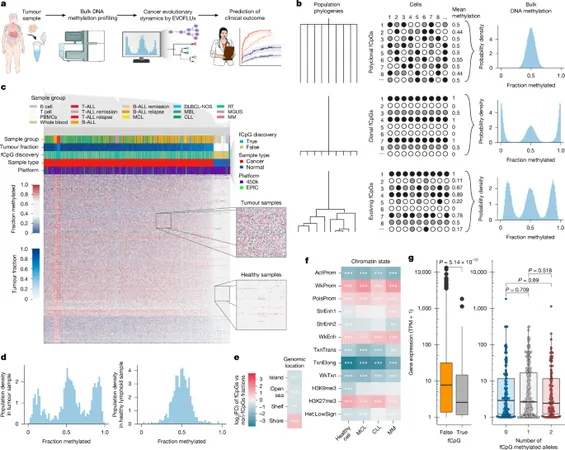
Revolutionary DNA Methylation Study Unraveling Cancer's Evolution
2025-09-10
Author: Arjun
Transforming Our Understanding of Cancer Progression
In a groundbreaking study, researchers have revealed how fluctuating DNA methylation patterns can illuminate the evolutionary path of cancer at a clinical scale. This research is set to revolutionize the way we understand and track cancer development.
An Extensive Dataset Analysis
The team meticulously assembled a staggering 2,430 DNA methylation samples from various lymphoid cancers, including subtypes of leukemia and lymphoma. Their dataset included healthy control samples as well as tumor samples at different stages of disease progression, such as diagnosis, relapse, and remission. This comprehensive approach ensures a robust analysis of the methylation landscape in cancer.
Precision Data Processing Pipeline
Using advanced data processing techniques, the researchers implemented a robust quality control pipeline, refining the data to include only the highest quality samples. This involved meticulous checks for methylation intensity, controlling for unexpected fluctuations, and ensuring the accuracy of every data entry.
Deciphering Tumor Purity and Dynamics
To assess the purity of tumor samples, the researchers employed a novel deconvolution strategy, allowing for accurate inference of tumor cell content, a critical aspect in understanding cancer behavior. This was particularly vital for subtypes like DLBCL and multiple myeloma, where traditional methods had fallen short.
Unraveling Fluctuating CpGs: New Insights Ahead
The research focused on specific fluctuating CpG sites (fCpGs), identified through rigorous statistical analysis. These sites displayed significant variations across different cancer types, serving as potential markers for tracking cancer evolution and heterogeneity.
Employing Long-Read Sequencing Technologies
To validate their findings, the team utilized cutting-edge long-read nanopore sequencing technology. This method provided deeper insights into the methylation status of fCpGs, reinforcing the correlation between their findings and previously established data.
Genomic Context of fCpGs Explored
Mapping these fCpGs against genomic and regulatory contexts, the researchers performed extensive bioinformatics analyses. This included gene-set enrichment analyses, allowing them to paint a fuller picture of how changes at these sites can influence cancer progression.
A Stochastic Model for Cancer Evolution
To simulate the dynamics of fCpGs over time, a novel generative model was developed, illustrating how these patterns shift in response to the evolutionary history of tumors. This model lays the groundwork for both understanding cancer evolution and developing targeted treatments.
Promising Clinical Implications
This comprehensive research holds immense potential for the future of cancer diagnostics and treatment. By tracking the evolution of DNA methylation patterns, doctors may better predict disease progression and tailor personalized therapies for patients, marking a significant step forward in oncology.
In Conclusion: A New Era in Cancer Research
As this study highlights the profound implications of fluctuating DNA methylation, it opens doors for further exploration of cancer evolution and its management. This is undoubtedly a pivotal moment in the quest to combat cancer more effectively than ever before.





 Brasil (PT)
Brasil (PT)
 Canada (EN)
Canada (EN)
 Chile (ES)
Chile (ES)
 Česko (CS)
Česko (CS)
 대한민국 (KO)
대한민국 (KO)
 España (ES)
España (ES)
 France (FR)
France (FR)
 Hong Kong (EN)
Hong Kong (EN)
 Italia (IT)
Italia (IT)
 日本 (JA)
日本 (JA)
 Magyarország (HU)
Magyarország (HU)
 Norge (NO)
Norge (NO)
 Polska (PL)
Polska (PL)
 Schweiz (DE)
Schweiz (DE)
 Singapore (EN)
Singapore (EN)
 Sverige (SV)
Sverige (SV)
 Suomi (FI)
Suomi (FI)
 Türkiye (TR)
Türkiye (TR)
 الإمارات العربية المتحدة (AR)
الإمارات العربية المتحدة (AR)